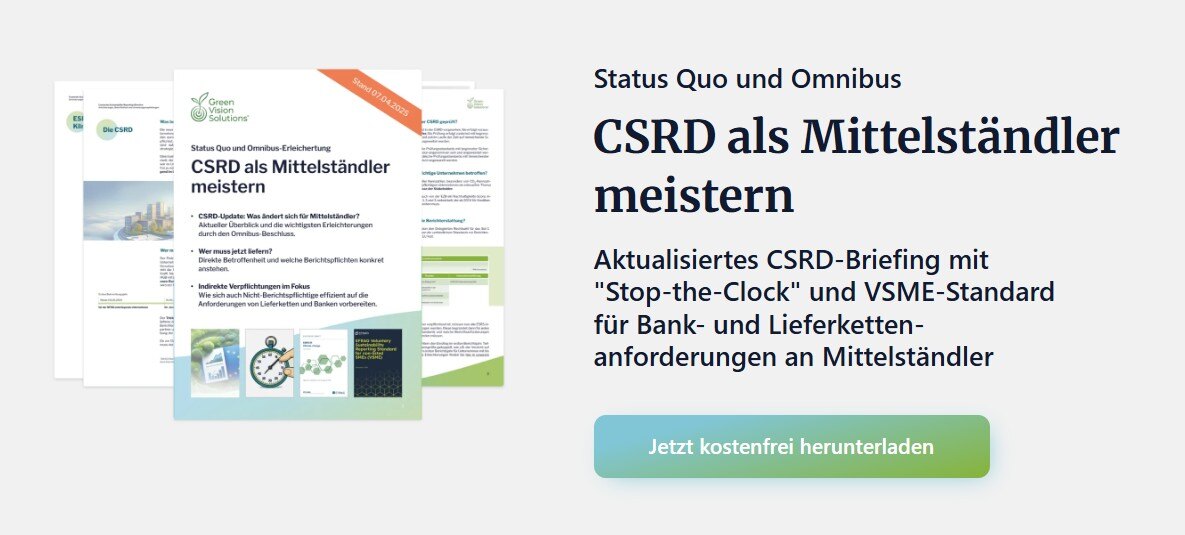More than just software: Your team for carbon accounting
We provide personalized support, a TÜV-certified process, and practical online seminars. → Learn more
| Update: 18. August 2025
🕓 Reading time 13 minutes

1. Who is affected by the CSRD Directive
Overview
The Corporate Sustainability Reporting Directive (CSRD) is an EU directive on corporate sustainability reporting according to clearly defined standards. Depending on the size of the company, reporting of non-financial indicators will also include CO2 emissions from 2024 onwards.
The CSRD Directive came into force on January 5, 2023. It is currently being transposed into national law by EU member states, including Germany. As of August 2025, Germany has not yet accomplished this and is still awaiting final adoption of the CSRD Implementation Act.
The CSRD replaces the previously applicable Non-Financial Reporting Directive (NFRD). The NFRD is an existing EU sustainability reporting requirement from 2014, which already applies to companies with over 500 employees. With the development of the new Corporate Sustainability Reporting Directive, the requirements for the information to be reported and the target audience for mandatory corporate reporting are now being significantly expanded.
The two fundamental innovations are:
1. Reporting must be included in the management report.
2. It must be carried out in accordance with clearly defined EU standards, the European Sustainability Reporting Standards (ESRS) .
The criteria for affected companies
Many of the more than 50,000 companies affected across Europe have not yet addressed the issue of CO2 metrics. However, implementation will become mandatory for companies already subject to the Non-Financial Reporting Directive (NFRD) as early as the 2025 reporting year.
For large companies, 2025 was originally planned as the first reporting year. However, in April 2025, with the “stop the clock” decision, the reporting requirements for the second wave (for “large” companies, originally from January 1, 2025) and the third wave (originally from January 1, 2026) were each postponed by two years. This means that companies have more time to prepare for the legal requirements.
The second wave currently includes “large” companies as defined in Section 267 (3) of the German Commercial Code (HGB) if they meet two of the following three criteria:
Change in threshold values
A proposal is currently being discussed to raise the threshold completely to companies with more than 1,000 employees and at least €50 million in annual revenue or €25 million in total assets. However, as of August 2025, this has not yet been implemented. This means that it remains unclear to companies whether and when they will be subject to the reporting requirement.
2. Innovations in sustainability reporting
CO2 reporting on Scope 1, 2, and 3 emissions required
The new EU directive CSRD significantly expands the reporting obligations of big European companies in the area of non-financial key figures.
The ESRS E1 Climate Change leads the topic-related ESRS standards. Like all topic-specific standards, it is subject to materiality analysis. However, it is expected that ESRS E1 Climate Change will be one of the material reporting topics for almost every company, as virtually all economic activities involve greenhouse gas emissions.
It requires companies to publish greenhouse gas emissions determined by a Corporate Carbon Footprint (CCF) in their management reports. The CCF, also known as the CO2 balance, is used to determine the annual greenhouse gas emissions for Scope 1, 2, and 3 within the company and identifying emission hotspots for the responsible use of the climate protection budget.
CO2 reporting must be prepared in accordance with the defined requirements of the EFRAG Standard ESRS E1 Climate Change. A rough approximation of the company's own emissions calculated internally is not sufficient.
CO2 reporting in accordance with the Greenhouse Gas Protocol is also at the heart of the data to be reported in voluntary reporting for SMEs or in supply chain requirements.

Uniform standards and presentation in the annual financial statements for CSRD reporting
Until now, companies were free to choose how to publish ESG information. One of the implications of the Corporate Sustainability Reporting Directive is that it will now be mandatory to publish ESG information in the management report as part of the annual financial statements.
At the same time, the development of binding European reporting standards (ESRS) covering the three areas of environment, social and corporate governance plays a central role. The aim of the European Sustainability Reporting Standards (ESRS) is to define the sustainability information that companies must report in accordance with the CSRD. The first set of ESRS was adopted on July 31, 2023.
The decision on which ESRS in the areas of environment, social and corporate governance must be reported is based on an individual materiality analysis for each company. This analysis forms the basis for decisions in all relevant areas of reporting. It is voluntary to provide an explanation as to why certain topics are not considered material. However, there is a special feature for ESRS E1: if ESRS E1 climate change is not considered material for a company, the conclusions of the materiality assessment must be explained in detail to justify the exclusion.
Audit of compliance with sustainability reporting
For approximately 50,000 companies in Europe, the CSRD requires a new chapter containing the required information to be added to the annual report. This chapter must contain an overview of the CSRD's defined non-financial key performance indicators in the correct format.
The CSRD stipulates an obligation for an external audit of the information. The audit is carried out by the auditor. However, an auditor cannot and may not override the collection of CO2Key performance indicators. Due to the strict audit criteria, the auditor relies on the companies' verified emissions data. Management, the executive board, and the supervisory board are expressly responsible for compliance with the CSRD.
The audit will initially be carried out with limited assurance and will be expanded over time to reasonable assurance.
VSME & Omnibus simplifications
Aktuelle Entwicklungen: Vorgaben zur CO₂-Bilanz für Mittelständler
21. Jan., 10.30-11.15 Uhr

CO₂ accounting with strong service
From the quintessence of our practical experience, our team at Green Vision Solutions has developed a clear and TÜV-certified process – and has already successfully applied it to over 200 companies.
With a permanent project sponsor and intuitive data entry software, we will also collect Scope 1, 2 and 3 data together with you – guaranteed to be easy and without any prior knowledge required on your part!
Find out more here
Subscribe to our free climate news (de) and never miss any industry news or articles!
Topics
Latest post
Omnibus Regulation: Far-reaching simplifications for the CSRD
Mehr als nur Software: Ihr Team für CO₂-BilanzenWir begleiten mit persönlicher Beratung, einem TÜV-zertifizierten Prozess und praxisnahen...
Introduction to the CO₂ balance
Calculate your CO2 footprint: This is the data companies need for their carbon footprint
Mehr als nur Software: Ihr Team für CO₂-BilanzenWir begleiten mit persönlicher Beratung, einem TÜV-zertifizierten Prozess und praxisnahen...
Regulatory frameworks
Omnibus Regulation: Far-reaching simplifications for the CSRD
Mehr als nur Software: Ihr Team für CO₂-BilanzenWir begleiten mit persönlicher Beratung, einem TÜV-zertifizierten Prozess und praxisnahen...
Entdecken Sie unsere Seminare & mehr
Find practical training courses on all aspects of greenhouse gas reporting

9.-11.03.26 | 3 Tage | Online
Calculation of the greenhouse gas balance via Scope 1-3
Learn how to calculate GHG emissions yourself - with methods, sources for emission factors and practical relevance

Mi 10.12. | 4 h | Online-Seminar
Materiality analysis and data preparation for CO₂ reporting
Avoid errors and additional effort: Which Scope 1 to 3 data are actually relevant according to GHG?

Do 15.01. | 3 h | Online-Seminar
Scope 3 Data Dilemma
Between data gaps and mountains of data: Coping with GHG in practice



